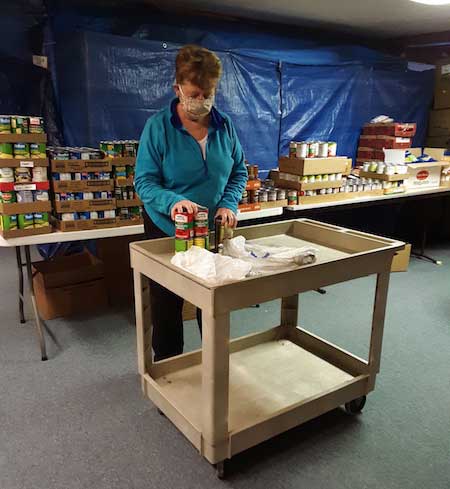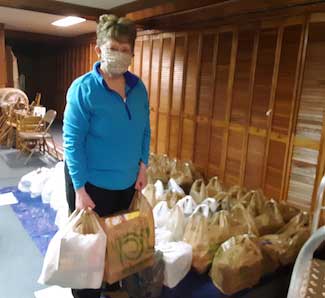Medina food pantries adapt to serve with social distancing restrictions

Robin Dubai selects canned goods to fill grocery bags at St. Peter’s emergency food pantry in Medina. With the recent coronavirus pandemic, the pantry has added evening hours in order to accommodate more people.
MEDINA – With hundreds out of work and grocery stores selling out, food pantries have had to adjust their operations to meet the demand.
There are two food pantries in Medina – one at Calvary Tabernacle Assembly of God located in the former Medina High School, and the Emergency Food Pantry at St. Peter’s Lutheran Church on West Avenue.
The Emergency Food Pantry originated out of an adult Sunday School class meeting in 1982, when members discussed doing something for the community. Unlike a regular food pantry where eligible families can come and receive food every week, the Emergency Food Pantry packages up bags of food which Medina residents can get once every three weeks. The pantry has a requirement that recipients must live in the 14103 zip code and they much bring proof of residency and family size with them.
Robin Dubai is coordinator of the food pantry, which is overseen by a board which includes herself, Jim Hancock as treasurer, Sally Grimm as volunteer coordinator, Jane Stroyan, Mary Lou Rue, Michelle Capstick and Marilyn Drew.
The pantry is open from 10 a.m. to noon on Tuesday, Thursday and Friday, and recently added evening hours from 5 to 7 p.m. on the first Tuesday and third Thursday of the month.
“We knew with so many people unemployed there might be a lot who would need extra help,” Dubai said.
The food bank gets supplies through a line of credit from Foodlink, where they also get a $4,000 a year grant. In addition, they receive surplus food from the federal government and the rest they purchase locally.
With the government demands for social distancing, both food banks have had to change their procedure. At St. Peter’s, Dubai and volunteers pack bags of food in the basement with assorted items, which are then taken upstairs and lined up by the door. Recipients come in one at a time, register and then exit out the side of the building.

Robin Dubai carries bags of food at St. Peter’s emergency food pantry.
With recent demands, Dubai said there is a shortage of some staples and she has had to substitute other items. Each person gets a bag containing three meals a day for three days for the size of their family. They cannot come again for three weeks, except in extreme emergencies, Dubai said.
Hancock said they normally see an influx of people on a fixed income at the end of the month. Their customers include families, single individuals and seniors.
At Calvary Tabernacle, Donna Poore is volunteer manager of the food bank. She and the Rev. Vincent Iorio think the food pantry has been serving the community for at least 25 years. They also receive food from a Foodlink grant, and personal and company donations of food and cash. Due to the concern for spreading the coronavirus, the pantry is not accepting donations from personal households at this time.
Calvary Tabernacle is slated to receive food donations every other year from the Boy Scouts annual food drive.
“This is our year to benefit from the Boy Scouts’ drive, but we don’t know how the pandemic is going to affect that,” Poore said. “That drive provides a lot of canned goods and shelf-stable foods for our pantry.”
During the first two to three weeks of the government-mandated shut-down, the food pantry saw an increase in demand of more than 50 percent, Poore said.
“But that has since leveled off,” she said. “I think people realize we are going to be here and they can come back in three weeks.”
The Calvary Tabernacle food pantry is open from 9 a.m. to noon on Tuesday and Thursday. Like St. Peter’s, they have had to implement safe procedures for greeting residents and delivering their food.
Bags are packed inside by volunteers, who watch the parking lot for people to pull in. Then a volunteer greets the person on the back porch by the parking lot, gets their name, the number in their family and inquires if they have been there before.
No one is allowed in the building, the Rev. Iorio said.
The food pantry serves an average of 30 families a week, Poore said.





































































